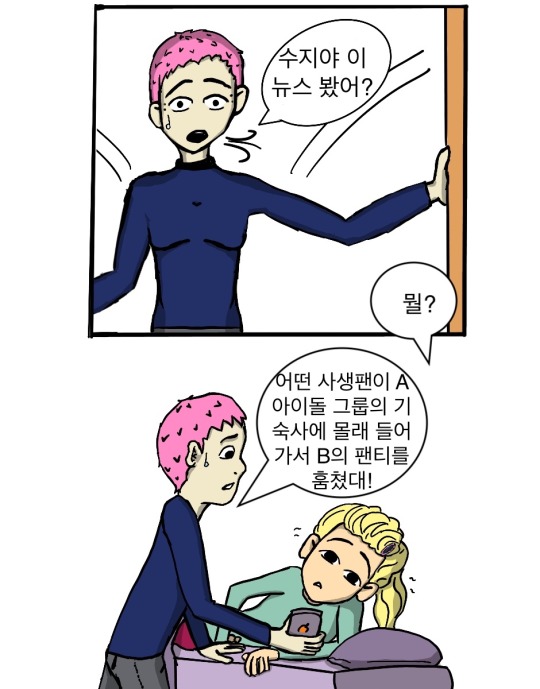#사생팬



Translation:
수지야 이 뉴스 봤어? Suzie, did you see this (news)?
뭘? What?
어떤 사생팬이 A 아이돌 그룹의 기숙사에 몰래 들어가서 B의 팬티를 훔쳤대! Some stalker fan snuck into A idol’s dorm and stole B’s underwear.
미친…제정신이 아닌가 봐. No f**king way…they’re out of their mind.
Notes
*사생팬
사생(활) is one’s private life. And 팬 is the English loan word for “fan” of an artist or something. Together 사생팬 describes a fan that invades the private life of a star or artist (often to an unbelievable degree) (사생팬: 유명한 사람의 사생활을 침해하는 팬). And with Kpop as crazy as it can be, sometimes fans do unacceptable things like sneaking into a famous celebrities house or stalking them. They can be described as a 사생팬.
*훔쳤대 Someone said someone stole (something)/I heard that someone stole (something)
(V-ㄴ/는대(요) or A-대(요)) is the contracted form of ㄴ/는다고 해(요) and 다고 해(요). This grammar point is for conveying speech that one heard from someone else.
For example:
My mom says it’s okay. 엄마는 괜찮대. (엄마는 괜찮다고 해/했어.)
My sister says she isn’t going. 언니는 안 간대요. (언니는 안 간다고 해요/했어요.)
This contracted form is used all the time in casual speech since it’s shorter. It can be used in the past tense 댔어(요), but it’s used in the present more often. It’s the difference between “My mom says it’s okay” and “My mom said it’s okay.” There really isn’t a huge difference in the message you want to convey.
*팬티
The English loan word panty (팬티) can be used for anyone’s underwear regardless of age or gender. I don’t know about other countries, but I had never heard panty used for underwear that wasn’t for adult women. So, I was a little surprised when I first heard it used for men’s underwear.
*미친
미치다 means to be crazy. And 미친 can be used as an abbreviated way to say that’s crazy/insane or respond to something like “no f–ing way” or “holy shit.” (미쳤다, 미친 사건, 미친 새끼) I’m not quite sure how this abbreviated form came to be, but it’s really common. *I would also like to mention here that 미치다 “to be crazy” is quite a bit more negative in Korean than it is in English. It’s used a lot more often as a curse. It’s can be used lightly among friends, but you should be quite close, as the nuance or intonation could hurt someone’s feelings.
*제정신
제정신 is one’s “right mind.” So, 제정신 아니다 would mean “to not be in one’s right mind.” So, if someone does something that’s kind of crazy or unacceptable, you might be able to use this word. 그 사람이 경찰 앞에서 물건을 훔쳤다고요? 제정신이 아닌가 봐요. (You’re saying) that person stole something right in front of the cops? They’re out of their mind.
I hope you enjoyed this post. Let me know if you have any questions!
It’s been a while since my last post, but I’m going to get back into the rhythm of things!
Follow me for more lessons.^^
